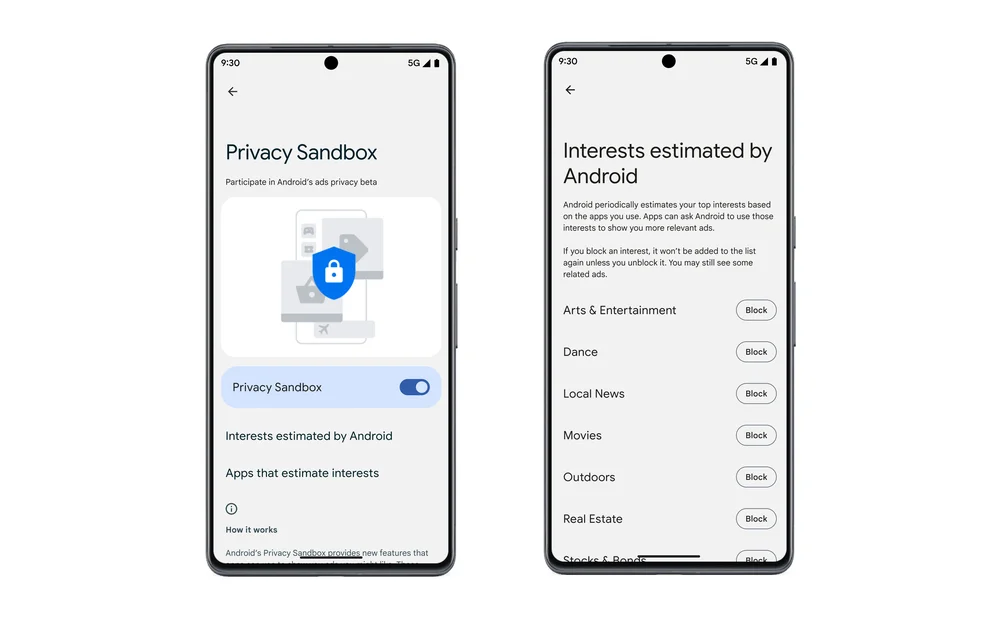Google's Privacy Sandbox beta on Android: A step forward for privacy, or a clever way to target you with more ads?

Google announced the beta launch of Privacy Sandbox, which aims to transform advertising. The inapt name of the feature, at least from a user perspective, is laying a smoke-screen.
The words privacy and sandbox have positive connotations, and Google uses the terminology to push the new ad system into its ecosystem.
In this week's announcement, Google notes that it is "developing solutions for digital advertising that limit user data sharing and don't rely on cross-app identifiers". The new system, called Privacy Sandbox, is now rolling out to select Android 13 devices in a beta phase.
The core differentiating factor between Privacy Sandbox and traditional, current, advertising systems is that the former moves tracking to a group level. Current advertising systems rely heavily on tracking. Advertisers aim to know a lot about users and use the information to display advertisement that they, or their systems, believe is most attractive to a particular user.
With Privacy Sandbox comes a shift to interest groups. There is no individual user tracking, which is good, but there is still tracking. Users are sorted into groups based on what they do on their devices. When a user visits lots of car, motorboat and cat websites, ads will predominantly focus on these groups to deliver ads.
Managing Privacy Sandbox
Android 13 device owners who are selected for the beta are in control, according to google. While they appear to be opted-in automatically, they may disable Privacy Sandbox and control their interests groups, according to Google.
They will also receive a notification on their Android 13 device that informs them that their device has been selected for the beta.
A new Privacy Sandbox section is available in the Settings app on Android devices. There, users may turn the feature off entirely. The same page lists current interests estimated by the Android device and by participating apps.
A click on either of these options displays all interests associated with the user. An option to block specific ads, e.g., for movies, local news or outdoors, is provided there as well.
Closing Words
Privacy Sandbox is one of Google's attempts to stay in control when it comes to advertising, at least on Android and on the Web. It is certainly an attractive proposition on first glance, as it eliminates individual user tracking in favor of group tracking.
Privacy advocates have pointed out that this is still tracking. Considering that Google plans to implement the feature in its Chrome web browser as well, it is also the first that is built directly into the company's browser.
The entire Privacy Sandbox idea is debated hotly. One group highlights that it makes tracking less invasive, as it moves it to a group level. Another group argues that tracking of user activity is still ongoing, as Android needs to identify the activity to associate the user with a particular group.
In any event, Google Android users may turn off Privacy Sandbox, at least for now, when they do not want to participate in it.
Now You: what is your take on Privacy Sandbox?























Install a Custom ROM like LineageOS, /e/ OS… Or better yet, if you have a Pixel, install GrapheneOS.
What? You can’t install a Custom ROM because your smartphone has an encrypted, impossible to unlock booloader? Well then, joke’s on you. Make sure to buy a device that you actually own next time.
*bootloader
@ Iron Heart what is your opinion regarding Adguard for both andriod and windows. Is it good to go in this future scenario and also on windows 11 OS?
“The core differentiating factor between Privacy Sandbox and traditional, current, advertising systems is that the former moves tracking to a group level.”
No, that’s Google’s presentation of it. The core differentiating factor is that now the browser/operating system itself will include a new dedicated spyware component for advertisers, that was not here before. It’s not an improvement in privacy when this is taken into account and we should resist it.
In addition to the new proposed surveillance system being embedded in the local code making Google’s plans even more invasive, we should not swallow Google’s lie that we’re supposed to accept a new surveillance system just because of promises of them to fight another one (even if that promise was fulfilled which is already far from obvious). These are two different issues.
“Privacy advocates have pointed out that this is still tracking.”
As pointed above, that’s true but only a part of the problem.
And do not trust either the even weaker position of Google controlled opponents like Mozilla Corporation whose technical analysis of Google’s “privacy sandbox” only aim to point at where Google’s design does not fully meet the requirement of only tracking in groups while not even really conceding that group tracking is still tracking. A former example here:
https://blog.mozilla.org/en/privacy-security/privacy-analysis-of-floc/
Yeah, I agree.